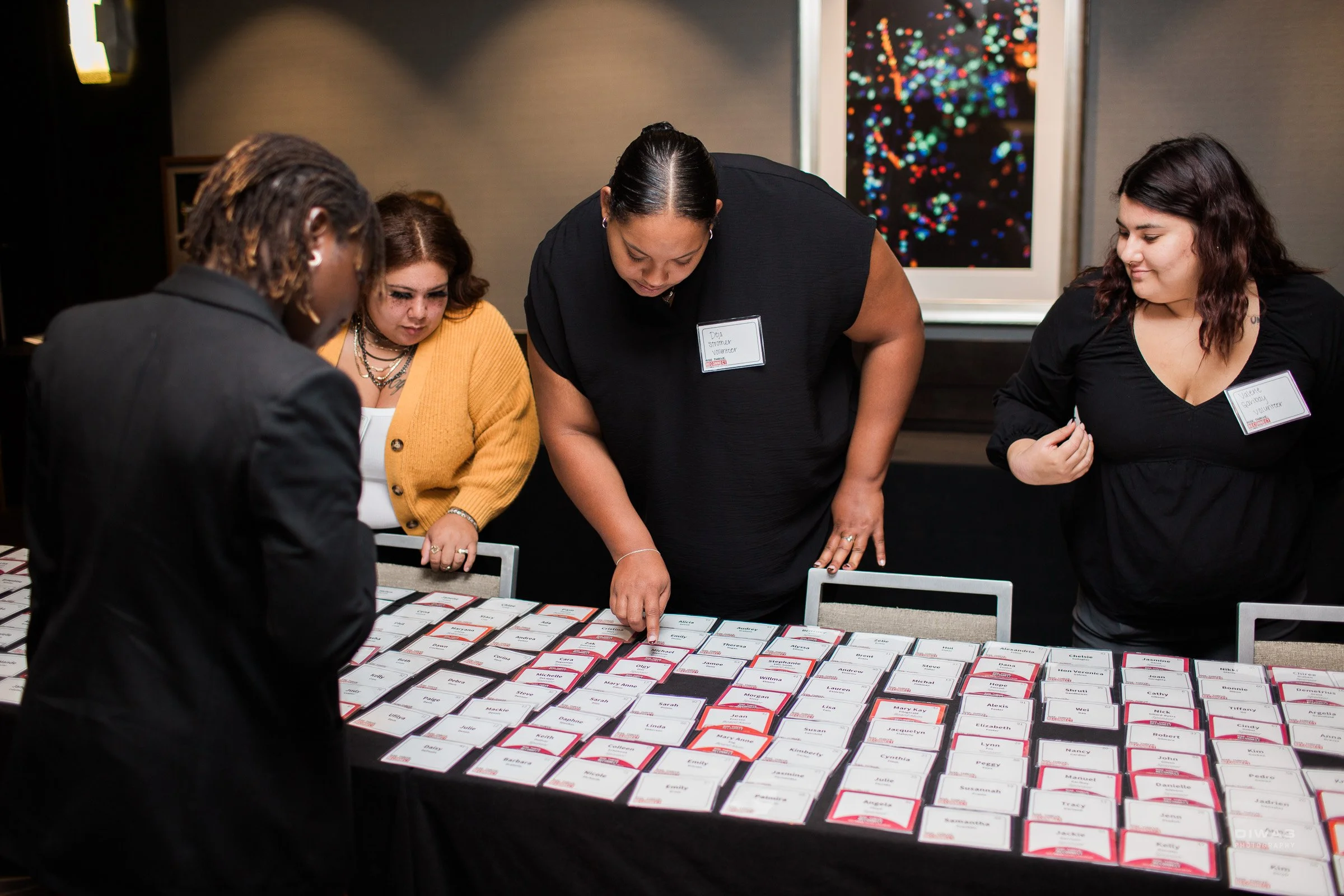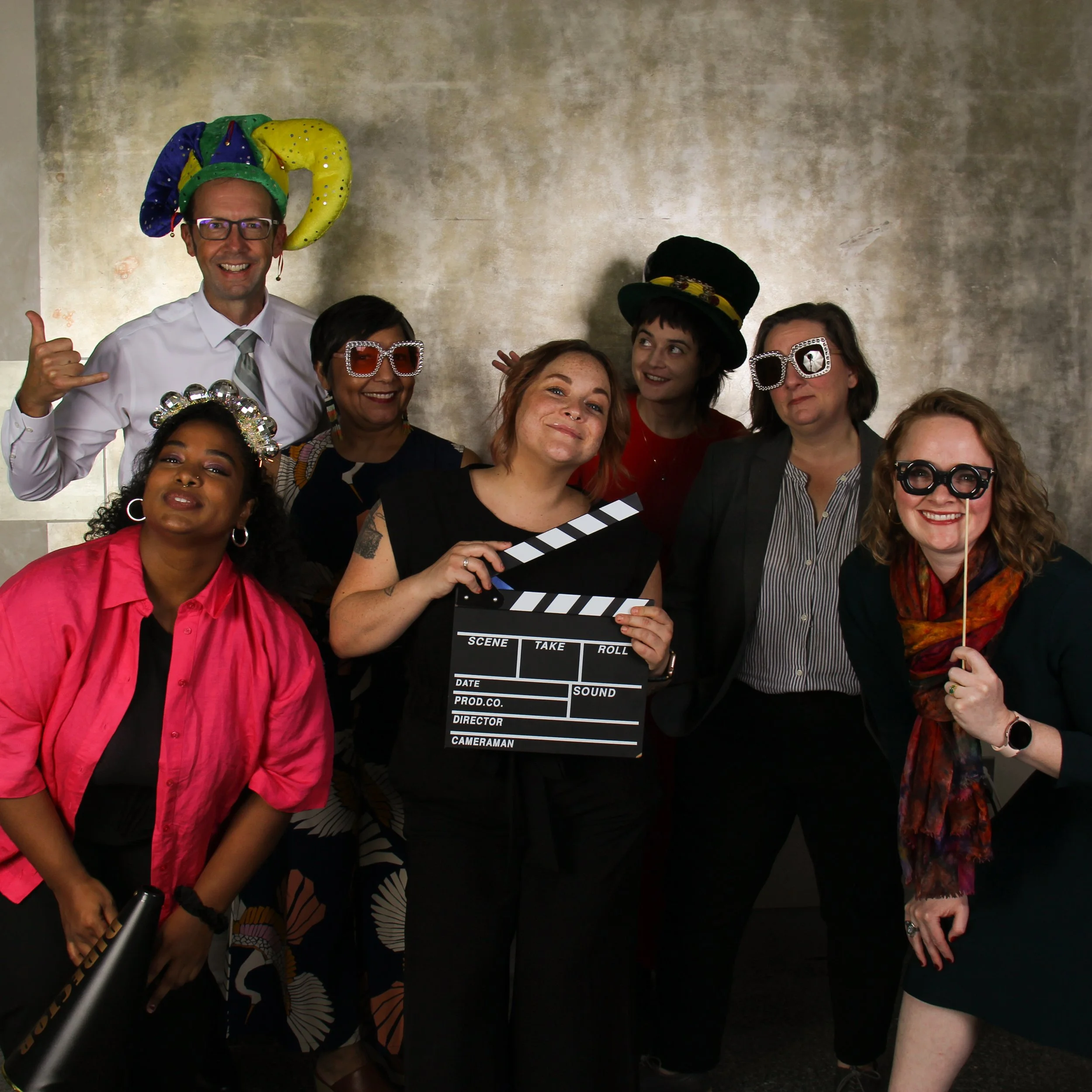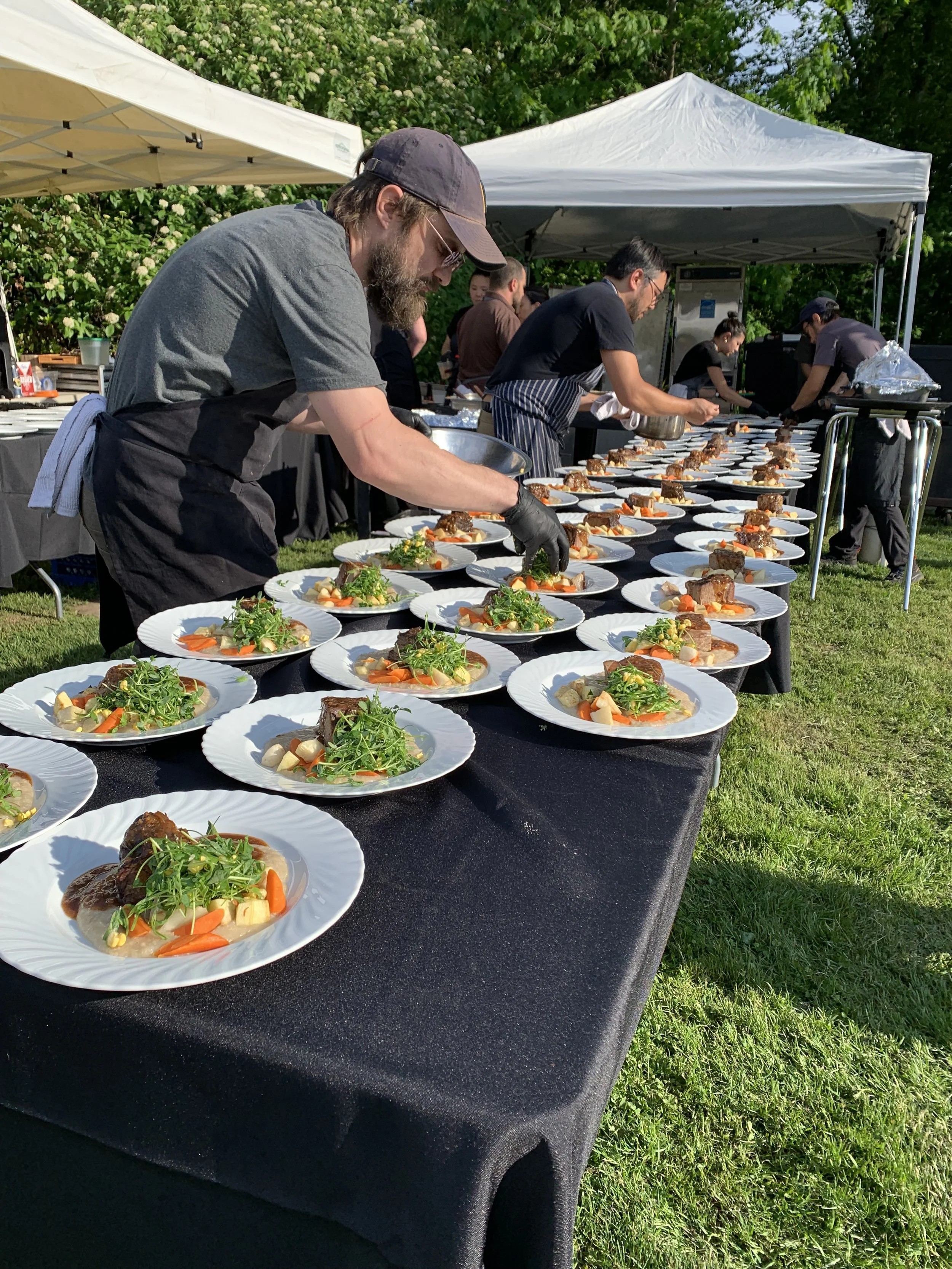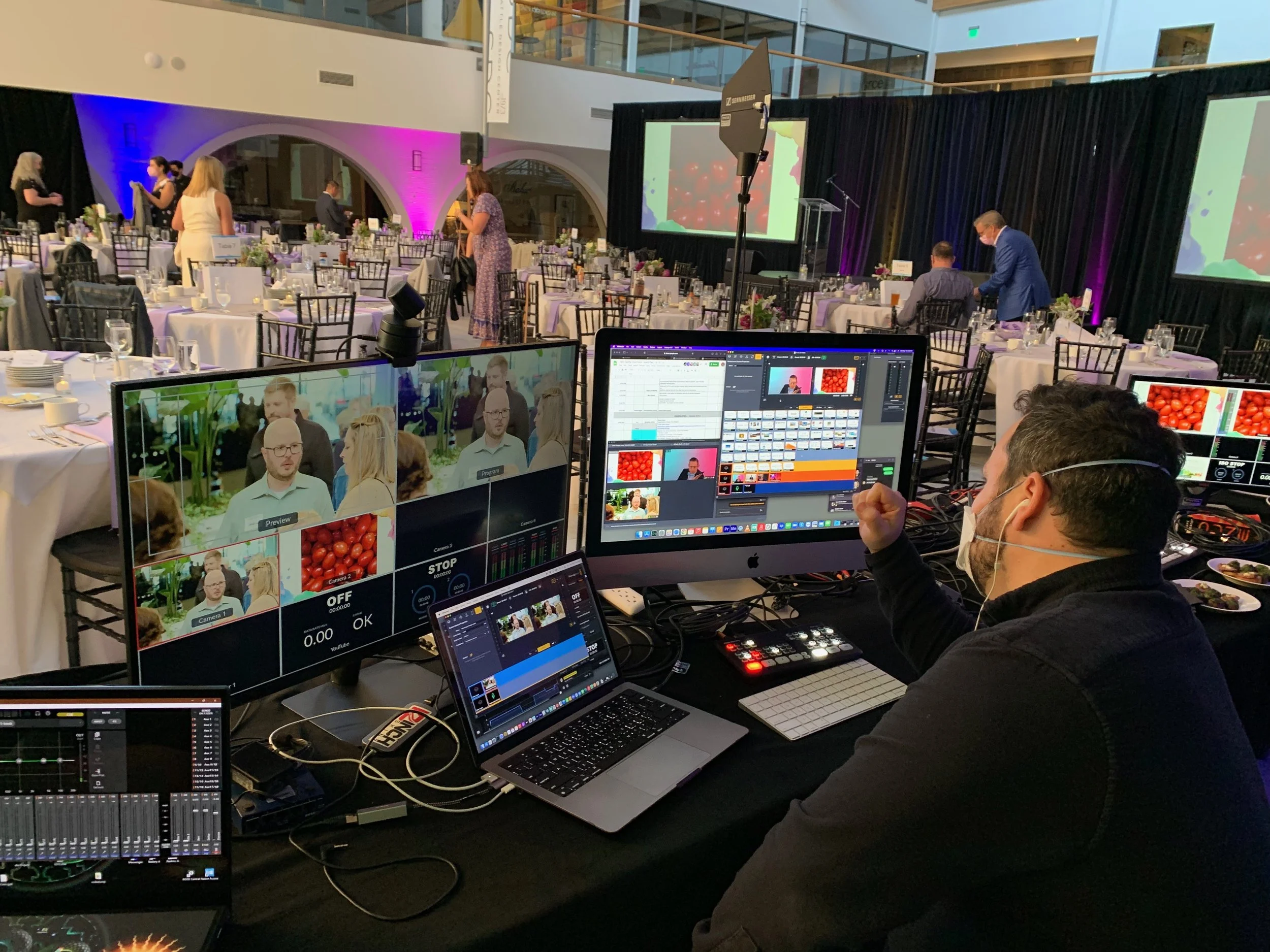Engaging Your Event Team
YWCA Volunteers in action at the “Inspire Luncheon” check-in table, 2023. Photo by DIWAS Photography.
[Description: Three people with friendly, yet serious expressions are standing behind a table, assisting a fourth person finding their name badge amongst the badges displayed on the table.]
Hosting a successful event is a team effort, not a solo sport! When we work with clients, we spend time helping them shape a successful event team. Here’s a little checklist you can use to approach this question for yourself: who’s on your event team? Read on for a breakdown of who should be involved in your nonprofit fundraiser, and when:
9-12 Months Before the Event:
Organizational Leadership (Board of Directors and Leadership Staff): Agree on the event’s budget, date, and goals.
Hot tip: as soon as you have a notion of when you want your event to be, book your venue and any scarce or specific talent, such as your fundraising host, special keynote speaker, or headline performer!
Specialty talent like musicians, keynote speakers, auctioneers and event hosts can make or break the success of your event. Don’t sleep on getting your first choice booked! Pictured is event emcee (and KEXP DJ and celebrated musician) Eva Walker onstage at Washington Farmland Trust’s “Love the Land” 2023. Photo by CB Bell.
[Description: A person with an infectious smile and a cute scarf tied around bountiful curls is standing at a microphone, arranging notes on a music stand.]
9 Months Before the Event:
Organizational Staff Lead: Make sure one key staff person is in place with the time and skills to coordinate all aspects of your event. They will ensure timely decisions, coordinate the efforts of the rest of the people on the staff team, and adjust strategies if needed.
After all the months of hard work, it’s fun to celebrate at the event with your work team! Our client Economic Opportunity Institute’s staff took this photo at their “Changemakers Dinner”, 2023. Photo by Youth In Focus.
[Description: a group of seven individuals hams it up for the camera, holding silly props and wearing sparkly hats and sunglasses.]
Key Staff Roles:
Your Development Director, Corporate Partnerships, Major Donor, Individual Donor, Development Database, and Communications personnel should all be in alignment with the event goals and understand their responsibilities around the event. Executive Director or CEO should be kept informed along the way as well.
Q: Wait, that’s a lot of people. How big does our event staff team need to be?
A: We understand that in a small org, all these ‘hats’ might be worn by just one or two people, or even filled by volunteers in some cases. The key thing is to be sure you’ve looked at your event through each of these lenses, and allocate time and effort in each area … or you’ll be missing out on real fundraising opportunities!
6-9 Months Before the Event:
Get down to business! Consider hiring an external event planner (Hot Tip: be in touch with us at Synchronicity, if you aren’t already!), and start booking additional vendors and building your event plans.
Key Professional Vendors for many fundraising events: Event Planner, Venue, Emcee, Fundraising Host or Auctioneer, Catering, Event Rentals, Video Producer, A/V, Event Photographer, Cashiering … and for some events, many many more!
Professional event vendors have the skills and capabilities to make your event dreams come true. In this photo, a chef with Brothers & Co Catering prepares meals for the Futurewise “Livable Communities” event 2023.
[Description: A chef wearing a black apron stands over a large table where dozens of dinner plates are lined up, outdoors on a green grassy field. Chef is adding festive salad greens to the colorful plates of food. In the background we see other food workers in action.]
A/V, along with catering, is one of the largest budget items for most fundraising events. Be sure you have professionals who can deliver exactly what you need! In this photo, we see video and livestream event producer Mark Jwayad at work at West Seattle Food Bank’s “Instruments of Change” event 2022.
[Description: A person sits at a tech station with two large monitors, a laptop, a switcher, and many cables. In the background, we see a room ready with dining tables, a stage, and a few nicely-dressed guests arriving.]
Once your event is 6 months or less away, you should also start engaging key pre-event volunteers such as Board Members and Table Hosts or Table Captains.
Board of Directors: Make sure your board members are well supported with information, proven tactics and coaching, so they can achieve their individual fundraising commitments around the event.
Q: Should we have an Event Committee?
A: Sure, if you want to! But be sure to use them appropriately, or there’s a risk they may create a lot of extra work for your team. We recommend convening your committee for 2 or 3 meetings total. Activate your committee for relationship-building activities, such as securing sponsors and partnerships and filling the room with guests (not for event design or strategic decision-making).
2 Months Before the Event:
Now is the time to recruit Event-Day Volunteers: Utilize volunteers for various event tasks that can be trained and completed onsite. Design the tasks and the day so your volunteers have a great experience. Match the roles to your volunteers’ personalities and interests, and they’ll be happy to return year after year to help out!
Q: How many event-day volunteers will we need?
A: For a high-complexity event with lots of activities onsite, like an auction or a food or beverage tasting event, you will need as many as 1 volunteer per 10 guests. For an event with fewer moving pieces, or when you choose to hire professionals to fill roles such as registration, you might find you can go as low as 1 volunteer per 50 guests.
Set-up volunteers preparing to paint the gallery walls before hanging art for the Pratt Fine Arts Center “Polka Dot Party” 2023. Photo by Michael B. Maine.
[Description: Two people are kneeling, pouring paint into a roller tray. They are surrounded by tools and supplies. In the background, we can see a large space, white walls, large white letters, a production cart, a lift, and another person working.]
Event day volunteers at the BrightSpark event 2023. Photo by Nick Hanyok.
[Description: Two people with joyful smiles are standing in a room, dressed for a party. They are wearing rolls of raffle tickets, and holding signs on tall sticks reading ‘RAFFLE’.]
By engaging the correct members of your team in these various stages, you'll maximize event success while building community support and involvement.
And of course, since this is a Synchronicity blog post, we can’t resist tossing in one more plug for Synchronicity’s services. We help each of our clients build a customized road map through the event planning and production process, and engaging your team is just one element on this journey. In addition to helping you get the right people engaged in the right activities at the right times, we can help remove parts of your plan that have a low ROI or negative impacts in your community. We can also help you reprogram toxic work habits that may have grown up around your annual event. When you work with us, you have access to our many, many years of experience and road-tested strategies … allowing you to make powerful improvements not just in the outcomes of your events, but also in HOW your event comes to be.
If there is an event on your horizon, let’s talk!
Synchronicity’s founder Alex Martin (wearing purple mask) prepares to facilitate an onstage rehearsal and sound check before the PEPS Luncheon 2023. Photo by Rudy Lopez.
[Description: A room dressed for a party with round dining tables, and a stage dressed with large letters reading ‘PEPS’. Onstage is one person standing at a podium, adjusting the microphone. Other people are clustered nearby.]








